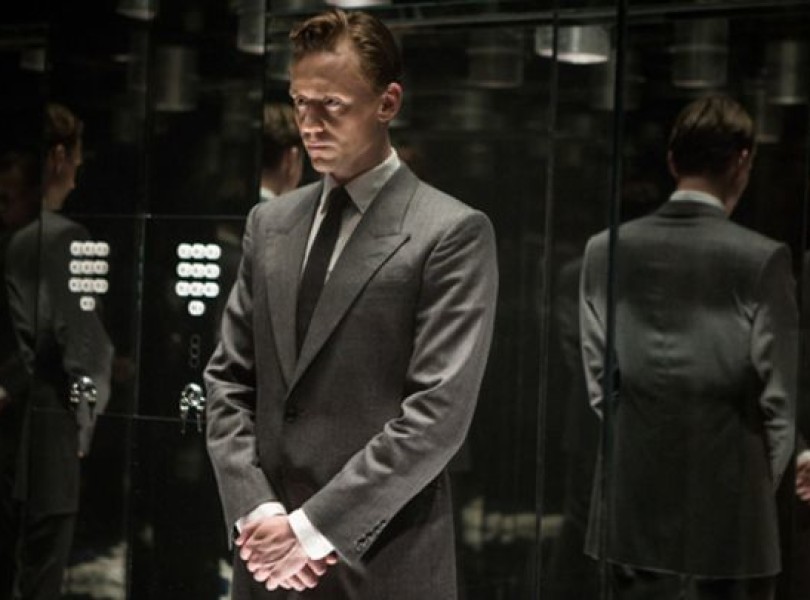Tom Hiddleston takes centre stage in a blackly comic adaptation of the J.G. Ballard novel.
By Chris Tilly
“Later, as he sat on the balcony eating the dog, so Dr Robert Laing reflected on the unusual events that had taken place within this huge apartment building during the previous three months.” So begins J.G. Ballard’s 1975 novel High-Rise, and director Ben Wheatley kicks-off his film adaptation in much the same fashion, with Tom Hiddleston playing the doctor in question, cooking up a canine storm and recounting the sorry tale that led him down such a dark route.
It’s a relatively faithful adaptation, the film filled with satire, horror and the blackest of humour. And the director of Down Terrace, Kill List and Sightseers is just the man to capture the uncomfortable and unsettling nature of the source material. But it doesn’t quite hold together in the final third, the film – much like the book – suffering from an underwhelming conclusion that fails to do justice to what has gone before.
Set in “a future that has already taken place” but ostensibly 1970s England, the film follows Laing’s efforts to settle into a tower block filled with folk that are increasingly living in a self-imposed exile. The slightly rich live on the lower floors, the quite rich take residence in the middle, and the very rich inhabit the upper echelons.
Laing is quiet, cool, calm and collected. His sister has recently deceased which may have something to do with his apathy and cold demeanour, and it’s through Laing’s detached world-view that we view the strange goings-on within this grey slab of concrete. There’s Steele (Reece Shearsmith) a busybody orthodontist constantly poking his nose in where it’s not wanted, Charlotte (Sienna Miller) the single mother who uses her sexuality as a weapon, Helen (Elizabeth Moss) who is both pregnant and troubled, and Wilder (Luke Evans), her husband, responsible for most of her troubles, and hell-bent on moving up in the world, both literally and metaphorically.
Because once you are in the high rise, you want what you haven’t got, the building a metaphor for Britain’s class divides. But it’s more than that, with Ballard inspired to write the tale by his experiences in a Shanghai internment camp, the book a dark and disturbing exploration of what happens when man becomes isolated and left to his own disturbed devices.
It begins with petty squabbles between the floors, which a series of power outages exacerbate. But soon rape and violence become regular occurrences. A children’s party turns into a riot, suicide and murder abound, the police turn a blind eye, and the residents decide that leaving the high-rise is secondary to what’s happening within.
If that sounds grim, onscreen it really isn’t, with Wheatley and screenwriter Amy Jump wringing every ounce of humour out of Ballard’s prose. Slow-motion and montage are used to underline the insanity of what’s taking place, while the re-imagining of an ABBA classic makes for one of the most entertaining musical moments of the year.
Hiddleston plays it deadpan as the doctor determined to get everything right, Miller delivers some killer lines, while Evans is a revelation as Wilder, stealing scenes with an over-the-top performance that perfectly matches the material.
Jeremy Irons is also well cast as Royal, the aristocratic architect who lives in the penthouse, designed the high-rise, and asks the most pertinent questions in a story that – much like the majority of Ballard’s books and Wheatley’s films – doesn’t offer any easy answers. He claims to have conceived of the building as a crucible for change, and yet seems unsurprised by the way in which it triggers such social collapse and decay, with the audience having to figure out the hows and whys.
Unfortunately the feature – much like the book – runs out of steam as the end approaches. The set-up is great, but there’s no real pay-off to this story, the narrative ending with a whimper when it promised a bang. So while Wheatley’s film is to be applauded for being a faithful adaptation, this is one occasion when taking liberties in the final third might have worked.
But it’s a valiant effort, with Jump’s caustic dialogue crackling with wit, Clint Mansell’s score surreal and superb, and Laurie Rose’s photography making it one of the best looking films of the year.
High-Rise is a deliciously dark satire that feels fresh and original in spite of the fact that it’s based on a book that was published 40 years ago. Ben Wheatley’s most visually arresting film, it’s fuelled by a superb soundtrack and fine performances. But it’s also a film that feels like it doesn’t have an ending, the journey startling but leading to a destination that ultimately disappoints.





